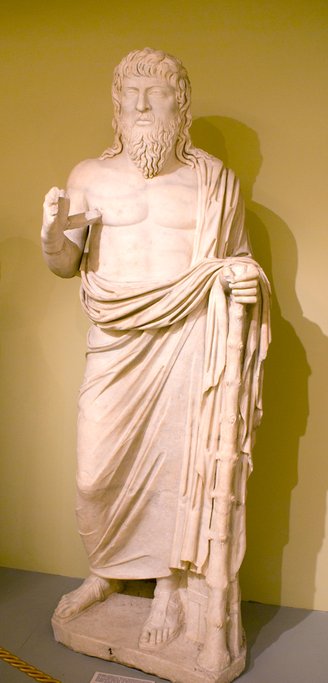For nearly 2,000 years, the Pythagorean philosopher Appolonius of Tyena (c. 15-100 AD) has been compared to Jesus by such diverse groups as Theosophists, deists, followers of the Bahá’í faith and sun-worshippers. We certainly know a lot more about him than the eponymous founder of Christianity, since letters ascribed to him survive, and he was celebrated by a whole passel of authors after his death.
Like Jesus, his birth was foretold by a supernatural being; he left home to preach a message that exalted the spiritual over the worldly; he believed he was divine; he cured the sick, cast out demons and raised the dead; and — unlike Jesus — he escaped crucifixion after being handed over to the Roman authorities as a heretic (possibly by besting the Emperor Domitian in debate).

Second century statue, probably depicting Apollonius of Tyena. Found at Gortyn on Crete, now in the Heraklion Archaeological Museum. (Christian Vandendorpe, Creative Commons)
There’s some question if he was born of a virgin, but it wouldn’t be too surprising. Virgin births were two-a-penny those days, for both gods and men: Dionysius, Perseus, Buddha, Krishna, Horace, Mercury and Romulus were all claimed to have a god for a father and born of a virgin.
So Jesus the god-man had his rivals and could hardly claim to be divinely unique. This much is, I believe, fairly common knowledge. Less appreciated is how much of his teaching was derived from earlier sources, in particular the “heaven and hell” myth.
Hell had already been established in the oral tales that were finally recorded by Homer in the Iliad and the Odyssey, at least 1,000 years before Jesus. Odysseus, for instance, goes to Hades (there was no heaven back then!) where the dead — good or bad, noble or peasant, brave or cowardly — all live eternal lives of utter boredom in their dank and gloomy netherworld.
(Even Achilles, greatest warrior of all! Odysseus spots him in Hades, saying, “We Argives considered you a god while you lived, and now you rule, a power, among the un-living. Do not grieve, then, Achilles, at your death.” Achilles responds, “Don’t try to reconcile me to my dying. I’d rather serve as another man’s laborer, as a poor peasant without land, and be alive on Earth, than be lord of all the lifeless dead.”)
By Plato’s time (fifth century BC), heaven had been added to the afterlife legends. Best known is his telling, in The Republic (the longest of Socrates’ dialogs), of the story of Er of Pamphylia. Er had died bravely in battle but (in a feat of spectacular timing) returned to life 12 days later just as his funeral pyre was about to be lit, having been sent back as a messenger of the gods. After death, his soul was transported to a waiting area full of other souls. Judges sent these souls into one of two openings, up for heaven, down for hell. After enjoying or enduring 1,000 years in either of these places, the souls were reunited in a meadow where they spent a week exchanging stories of what a great/lousy time they’d been having. After seven days of regaling and partying, the souls were returned to Earth, reincarnated in humans or animals according to the whim of The Fates.
Predictably, Socrates ends the story of Er with an uplifting moral: “If…we shall believe that the soul is immortal and capable of enduring all extremes of good and evil, and so we shall hold ever to the upward way and pursue righteousness with wisdom…”
Plato was one of the first, but far from the last, of Greek writers who promoted the idea of our postmortem existence as an up-or-down deal: you’re good, you go to heaven — and vice versa. So by the time Jesus started preaching, some time around 30 AD, heaven and hell were well-established destinations. He may, though, have been the first to divide us into “sheep” and “goats.” It’s all in Matthew 25: 31-46.
Given the options, “down” sounds a bunch more interesting than “up.” FWIW, my money’s on the goats.
CLICK TO MANAGE